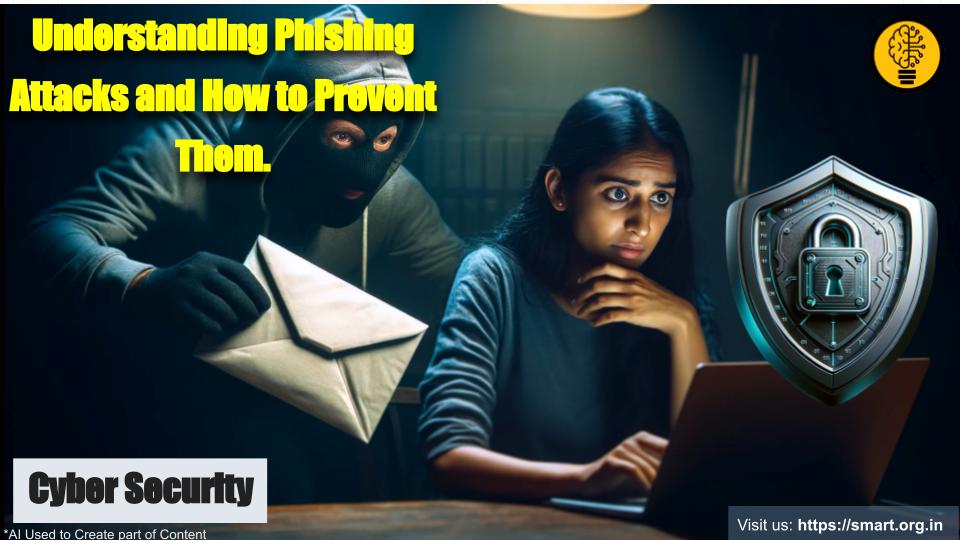In the digital age, Phishing Attacks have emerged as a prevalent threat to online security. These deceptive techniques aim to trick individuals into divulging sensitive information, such as passwords, credit card details, and personal identification numbers. Understanding the mechanics of phishing and adopting effective prevention measures is crucial for safeguarding personal and organizational data.
Recognizing Phishing Techniques
Phishing Attacks employ various strategies to deceive their targets. Recognizing these techniques is the first step in defence.
- Email Phishing: The most common form involves sending fraudulent emails that mimic legitimate organizations, urging recipients to provide sensitive information.
- Spear Phishing: A more targeted approach, where attackers personalize emails to specific individuals, making the deception harder to detect.
- Whaling: A form of spear phishing that targets high-profile individuals like executives, with emails that often involve legal or business matters.
- Vishing and Smishing: Phishing conducted via phone calls (voice phishing) and SMS texts (SMS phishing), respectively, often pretending to be from a bank or a trusted institution.
- Website Phishing: Creating fake websites that resemble legitimate ones, tricking users into entering their personal information.
Key Indicators of Phishing Attempts
Being able to identify potential phishing attempts is essential for prevention.
- Suspicious Email Addresses: The sender’s email might resemble a legitimate address but with subtle differences or misspellings.
- Unsolicited Attachments or Links: Phishing emails often include attachments or links that they urge you to open.
- Urgent or Threatening Language: Messages that create a sense of urgency or fear, prompting immediate action.
- Request for Personal Information: Legitimate organizations rarely ask for sensitive information via email or text.
- Poor Grammar and Spelling: Professional entities typically ensure their communication is error-free.
Preventative Measures
Adopting a proactive approach to security can significantly reduce the risk of falling victim to Phishing Attacks.
- Education and Awareness: Regular training sessions for individuals and employees on recognizing and responding to phishing attempts.
- Email Filters and Security Software: Implement advanced email filtering and update security software to detect and block phishing attempts.
- Multi-Factor Authentication (MFA): Use MFA wherever possible to add an additional layer of security, making stolen information less useful to attackers.
- Regular Updates: Keep all systems and software updated to protect against known vulnerabilities.
- Data Backup: Regularly back up data to minimize damage in case of a successful attack.
- Verification: Always verify the authenticity of requests for sensitive information by contacting the organization directly through official channels.
In Case of a Phishing Attacks
If you suspect you’ve been targeted by a phishing attempt, immediate action can help mitigate potential damage.
- Do Not Respond: Avoid clicking on links, downloading attachments, or replying with personal information.
- Report the Attempt: Inform the IT department if you’re part of an organization, or report to relevant authorities like the Anti-Phishing Working Group.
- Change Your Passwords: If you suspect your information might have been compromised, change your passwords immediately.
- Monitor Your Accounts: Keep an eye on your bank and online accounts for any unusual activity.
Phishing Attacks pose a significant threat in the digital world, but with the right knowledge and preventive measures, individuals and organizations can protect themselves effectively. Staying informed about the latest phishing techniques and maintaining a vigilant approach to online security are key to staying one step ahead of cybercriminals.
Smart Group India is at the forefront of empowering startups and corporates with essential knowledge to thwart phishing attacks. Through comprehensive workshops and cutting-edge cybersecurity tools, they provide the vital education needed to identify and prevent these digital threats. Their proactive approach in fostering a culture of cybersecurity awareness is instrumental in safeguarding the digital assets of emerging and established businesses alike.


In conclusion, we at Smart Group hope this article has provided you with valuable insights and actionable strategies. Smart Group India Incubation provides a nurturing environment for startups, offering comprehensive support and resources to foster growth and innovation. With access to expert mentorship, state-of-the-art infrastructure, and networking opportunities, startups can thrive in their journey from ideation to market launch. Explore our services in DevOps consultancy, IoT solutions, and cybersecurity to leverage cutting-edge technology for your business success. Join us to embark on a transformative journey towards entrepreneurial excellence. For further information and a deeper dive into this topic, we encourage you to explore the following resources. These links offer a wealth of knowledge and expert opinions that can enhance your understanding and assist you in applying these concepts effectively.
Startup Policies Govt. Of India
Startup News Sites
Publications
Research Papers